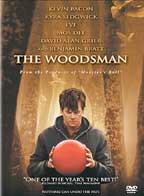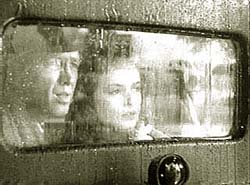
The Woodsman, your first movie (written and directed), knocked me out. I can'’t think of any observation worth mentioning that can take away from the total effect.
When people say that all the really terrific, boundary-crossing stories were told in the '70s, I say: "“Three words: 'bullshit,' and '‘The Woodsman.'"” Here are just some of the ways you made a great movie.
Generally: Simple. Direct. Unflinching. Unsentimental.
Specifically, visual imagination: When Walter (Kevin Bacon) and Vicki (Kyra Sedgwick) first have sex, the editing takes us into the moment, but it is a moment interposed with after and before. This scene shows us the weight of anticipation and afterthought, of anxiety and shame that Walter feels.
Story moment: Hanging in the air in a story about pedophilia is the question, "“Is Walter still a compulsive lover of little girls?" And until the audience gets an answer, they keep him at arms length. If he is, he may deserve the viewers'’ disgust. By establishing a sexual and, by slow degrees, intimate relationship with Vicki, the audience begins to trust Walter. There are signs he'’s changing. We hope he achieves his "“normal" as much as he does.
Music: The absence of music at a number of points intensifies the dead-on stare this story uses to examine Walter'’s transition and struggle to become a good man. Immediately before Vicki and Walter play pool to "There's a whole lot of rhythm going round...,"” a silence hangs in the air like real life. That long. That uncomfortable.
Acting: Less than a half hour into the movie, Vicki learns Walter'’s secret. She sits in the truck and it washes over her. She sits still. She doesn'’t erupt with emotion. Tears, vomiting, rage. These were all possibilities. But by containing her emotion, the audience learns that Vicki is much stronger than we realized. This scene sets the stage for her to reveal that she has been sexually abused too, but that she doesn'’t hate her abusers.
As you can see, most of these observations come from the first half of the movie. By the 45-minute mark, all of the strengths of the movie are in play and the story follows its course naturally. Thanks for such good work, and for your careful choice of material to adapt.
Looking forward to your next movie,
John



1 comment:
I agree about the movie being necessarily small because the material is off-putting. But let me say why I wanted to cheer for Walter, if not jump up from the sofa and do a happy dance. What Walter has in common with viewers, and why the play and movie had a life at all, is that he suffers an isolation because of who he is. His inner battle to be good - normal - must also be won alone. Because of who he is, he remains alone in the crowd. This is a feeling that, assuming you're one of those folks who suspects we're all alone in the universe, oppresses us human beings from time to time. And the constant surprise of living is that solace comes in small ways from unlikely places. In this case, Vicki. In The Woodsman, the worst transgression can be forgiven and the transgressor restored to community. (Right up front I admitted I'm I fan!)
Admittedly, a pedophile is the least likely character to choose carry the message and bring them in with popcorn. But damn, Kassel did a lot with a little. This story is s based on a play by Stephen Fechter, who became a something of a collaborator with Kassell. I understand she's adapting an Arthur Miller play for the screen now. That should have wider, if equally tragic, appeal.
Post a Comment